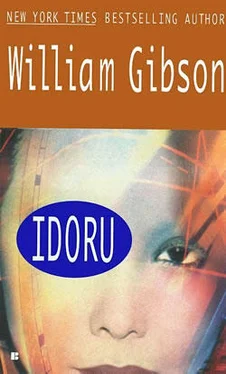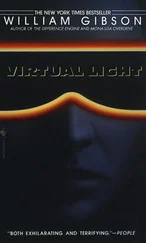“Thanks,” Maryalice said. “Here,” and she handed Chia a crumpled square of sticky-backed paper with a bar code on it. “That’s the check. Now we just want to go this way.”
It was even harder getting through the crowd, lugging Mary-alice’s bag. Chia had to concentrate on not stepping on people’s feet, and not bumping them too hard with the bag, and the next thing she knew, she’d lost Maryalice. She looked around, expecting to see hair-extensions bobbing above the crowd, who were mostly shorter than Maryalice, but Maryalice was nowhere in sight.
ALL ARRIVING PASSENGERS MUST EXIT THROUGH CUSTOMS.
Chia watched the sign twist itself up into Japanese letters, then pop back out as English.
Well, that was the way to go. She got in line behind a man in a red leather jacket that said “Concept Collision” across the back in gray chenille letters. Chia stared at that, imagining concepts colliding, which she guessed was a concept in itself, but then she thought it was probably just the name of a company that fixed cars, or one of those slogans the Japanese made up in English, the ones that almost seemed to mean something but didn’t. This trans-Pacific jet lag thing was serious.
“Next.”
They were feeding Concept Collision’s suitcase through a machine the size of a double bed, but taller. There was an official of some kind in a video-helmet, evidently reading feed off the scanners, and another policeman, to take your passport, slot it in the machine, then put your bags through. Chia let him take Maryalice’s suitcase and flip it up, onto the conveyor. Chia handed him her carry-on. “There’s a computer in there. This scan okay for that?” He didn’t seem to hear her. She watched her carry-on follow Maryalice’s bag into the machine.
The man in the helmet, eyes hidden, was bobbing his head from side to side as he accessed gaze-activated menus.
“Baggage check,” the policeman said, and Chia remembered she had it in her hand. It struck her as strange, handing it over, that Maryalice had thought to give her that. The policeman ran a hand-scanner over it.
“You packed these bags yourself?” asked the man in the helmet.
He couldn’t see her directly, but she assumed he could see the clips stored in her passport, and he could probably see her on live feed as well. Airports were full of cameras.
“Yes,” Chia said, deciding it was easier than trying to explain that it was Maryalice’s bag, not hers. She tried to read the expression on the helmeted man’s lips, but it was hard to say if he even had one.
“You packed this?”
“Yes,” Chia said, not sounding nearly as certain this time.
The helmet bobbed.
“Next,” he said.
Chia went to the other end of the machine and collected her bag and the black suitcase,
Through another sliding wall of frosted glass: she was in a larger hall, beneath a higher ceiling, bigger ads overhead but no thinning of the crowd, Maybe this wasn’t so much a matter of crowds as it was of Tokyo, maybe of Japan in general: more people, closer together.
More of those robot baggage carts. She wondered what it cost to rent one. You could lie down on top of your luggage, maybe, tell it where you wanted to go, and then just go to sleep. Except she wasn’t sure she felt sleepy, exactly. She transferred Maryalice’s bag from her left to her right hand, wondering what to do with it if she didn’t find Maryalice inside the next, say, five minutes. She’d had enough of airports and the space between them, and she wasn’t even sure where she was supposed to sleep tonight. Or if it was night, even.
She was looking up, hoping to find some kind of time display, when a hand closed around her right wrist. She looked down at the hand, saw gold rings and a watch to match, fat links of a gold bracelet, the rings connected to the watch with little gold chains.
“That’s my suitcase.”
Chia’s eyes followed the hand’s wrist to a length of bright white cuff, then up the arm of a black jacket. To pale eyes in a long face, each cheek seamed vertically, as if with a modelling instrument. For a second she took him for her Music Master, loose somehow in this airport. But her Music Master would never wear a watch like that, and this one’s hair, a darker blond, was swept back, long and wetlooking, from his high forehead. He didn’t look happy.
“Maryalice’s suitcase,” Chia said.
“She gave it to you? In Seattle?”
“She asked me to carry it.”
“From Seattle?”
“No,” Chia said. “Back there. She sat beside me on the plane.”
“Where is she?”
“I don’t know,” Chia said.
He wore a black, long-coated suit, buttoned high. Like something from an old movie, but new and expensive-looking. He seemed to notice that he was still holding her wrist; now he let it go.
“I’ll carry it for you,” he said. “We’ll find her.”
Chia didn’t know what to do. “Maryalice wanted me to carry it.”
“You did. Now I’ll carry it.” He took it from her.
“Are you Maryalice’s boyfriend? Eddie?” The corner of his mouth twitched.
“You could say that,” he said.
Eddie’s car was a Daihatsu Graceland with the steering wheel on the wrong side. Chia knew that because Rez had ridden in the back of one in a video, except that that one had had a bath in it, black marble, big gold faucets shaped like tropical fish. People had posted that that was an ironic take on money, on the really ugly things you could do with it if you had too much. Chia had told her mother about that. Her mother said there wasn’t much point in worrying what you might do if you had too much, because most people never even had enough. She said it was better to try to figure out what “enough” actually meant.
But Eddie had one, a Graceland, all black and chrome. From the outside it looked sort of like a cross between an RV and one of those long, wedge-shaped Hummer limousines. Chia couldn’t imagine there’d be much of a Japanese market; the cars here all looked like little candy-colored lozenges. The Graceland was meshback pure and simple, designed to sell to the kind of American who made a point of trying not to buy imports. Which, when it came to cars, def initely narrowed your options. (Hester Chen’s mother had one of those really ugly Canadian trucks that cost a fortune but were guaranteed to last for eighty-five years; that was supposed to be better for the ecology.)
Inside, the Graceland was all burgundy velour, puffed up in diamonds, with little chrome nubs where the points of the diamonds met. It was about the tackiest thing Chia had ever seen, and she guessed Maryalice thought so too, because Maryalice, seated next to her, was explaining that it was an “image” thing, that Eddie had this very hot, very popular country-music club called Whiskey Clone, so he’d gotten the Graceland to go with that, and he’d also started dressing the way they did in Nashville. Maryalice thought that look suited him, she said.
Chia nodded. Eddie was driving, talking in Japanese on a speakerphone. They’d found Maryalice at a tiny little bar, just off the arrivals area. It was the third one they’d looked in, Chia got the feeling that Eddie wasn’t very happy to see Maryalice, but Maryalice hadn’t seemed to care.
It was Maryalice’s idea that they give Chia a ride into Tokyo. She said the train was too crowded and it cost a lot anyway. She said she wanted to do Chia a favor, because Chia had carried her bag for her. (Chia had noticed that Eddie had put one bag in the Graceland’s trunk, but kept the one with the Nissan County sticker up front, next to him, beside the driver’s seat.)
Chia wasn’t really listening to Maryalice now; it was some time at night and the jet lag was too weird and they were on this big bridge that seemed to be made out of neon, with however many lanes of traffic around them, the little cars like strings of bright beads, all of them shiny and new. There were screens that kept blurring past, tall and narrow, with Japanese writing jumping around on some of them, and people on others, faces, smiling as they sold something.
Читать дальше











